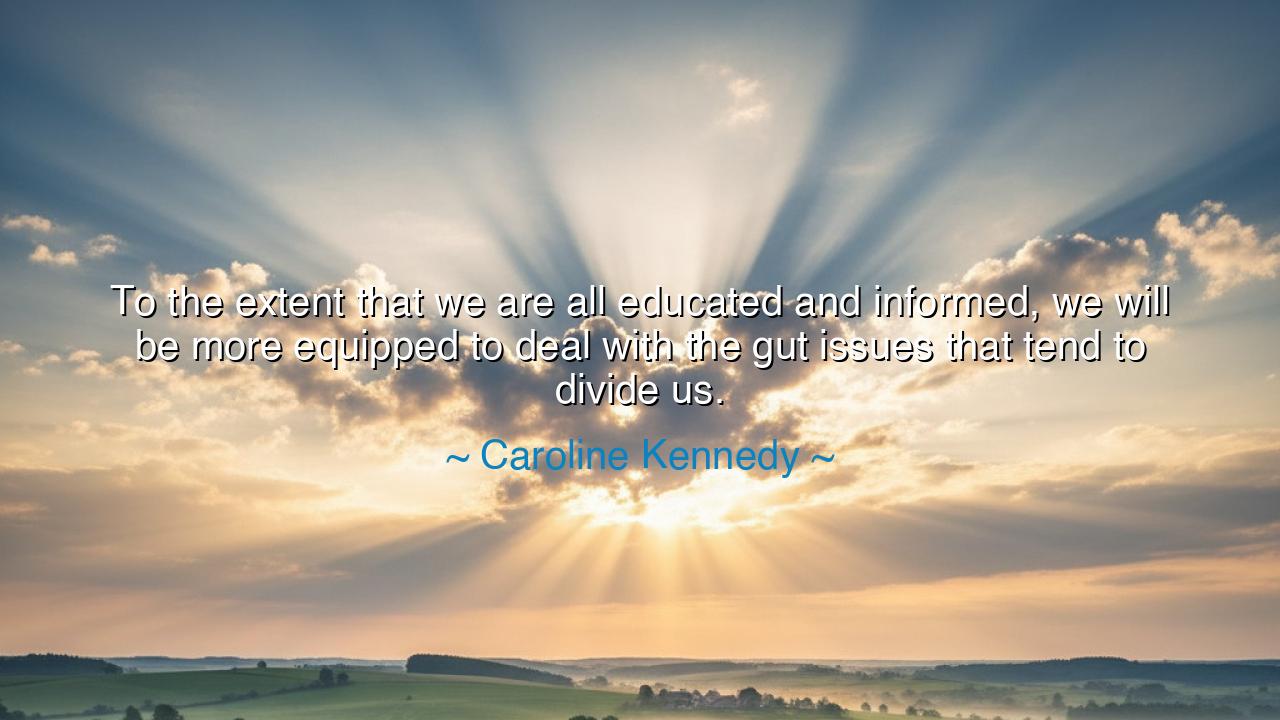
To the extent that we are all educated and informed, we will be
To the extent that we are all educated and informed, we will be more equipped to deal with the gut issues that tend to divide us.






There is quiet strength and civic wisdom in the words of Caroline Kennedy, when she said: “To the extent that we are all educated and informed, we will be more equipped to deal with the gut issues that tend to divide us.” Her words, though calm and modern, carry the tone of an ancient truth — that knowledge is the bridge between conflict and understanding, and that ignorance is the seed of division. Born of a legacy of public service and moral courage, Kennedy speaks not only as a stateswoman but as a daughter of history, heir to a vision of democracy grounded in the belief that enlightenment is the foundation of unity.
In her statement, she draws a line between two worlds — the world of education and understanding, and the world of instinct and division. The “gut issues” she refers to are the raw, emotional conflicts that arise from fear, anger, and misunderstanding — the issues that make people turn against one another not because of truth, but because of passion untempered by reason. Her message is that the more we learn — not just from books, but from history, from empathy, and from one another — the more capable we become of turning disagreement into dialogue, and division into discovery.
To be educated and informed, as Kennedy envisions, is not merely to possess knowledge, but to cultivate wisdom — to see through illusion, to question prejudice, to discern truth from noise. It is an education of both the mind and the heart. For it is not ignorance of facts alone that divides people, but the blindness of spirit that refuses to understand the experiences of others. Kennedy reminds us that education, at its highest form, is not the accumulation of data, but the cultivation of compassion — the discipline of looking beyond one’s tribe, one’s bias, and one’s pride.
History offers us shining examples of this truth. Consider the struggle of Nelson Mandela, who emerged from decades of imprisonment not with hatred, but with vision. South Africa, torn by generations of racial division, could easily have plunged into vengeance. Yet Mandela, understanding that education and awareness were the only forces strong enough to rebuild a nation’s soul, championed reconciliation through knowledge. He knew that ignorance breeds fear, and fear breeds hatred — but that truth, when shared openly, heals. His leadership embodied Caroline Kennedy’s wisdom: that a people informed by understanding can overcome the deepest wounds of history.
The same principle has echoed throughout civilizations. When Pericles of Athens built the world’s first democracy, he placed education at its heart, believing that informed citizens were the guardians of justice. When Abraham Lincoln spoke of a nation “conceived in liberty and dedicated to the proposition that all men are created equal,” he knew that equality could not survive without enlightenment. And today, as societies struggle with division born of misinformation, Caroline Kennedy’s words sound as an echo of those ancient voices — a plea for the return of reason to a world ruled too often by reaction.
Her wisdom also carries a warning: ignorance is not neutral — it is fertile ground for manipulation. A population uninformed becomes prey to those who profit from fear. But an informed citizenry cannot be easily divided, for truth strengthens the bonds of fellowship. Education, then, is not simply a personal privilege; it is a collective safeguard. Every mind enlightened adds light to the whole; every truth understood becomes a wall against deceit. The wise nation educates its people not merely to compete, but to coexist — to build a society where discussion replaces anger, and learning replaces suspicion.
Let this be the lesson that endures from Caroline Kennedy’s words: that unity begins in understanding. If the heart is guided by emotion, let the mind be guided by reason. If the world seems dark with division, let the lamp of education be lit in every home and every soul. Study not only to advance, but to comprehend. Listen not only to argue, but to learn. For when people know — truly know — they no longer fear each other; they begin to see themselves reflected in one another.
Thus, her message becomes both a call and a comfort for our age: education is the cure for discord, and understanding the highest form of peace. To learn is to strengthen the bonds of humanity, and to remain ignorant is to surrender them. The wise will therefore make of their learning not a shield of pride, but a bridge of compassion — for only through shared knowledge can the world heal, and only through enlightenment can we become, at last, one people.






AAdministratorAdministrator
Welcome, honored guests. Please leave a comment, we will respond soon